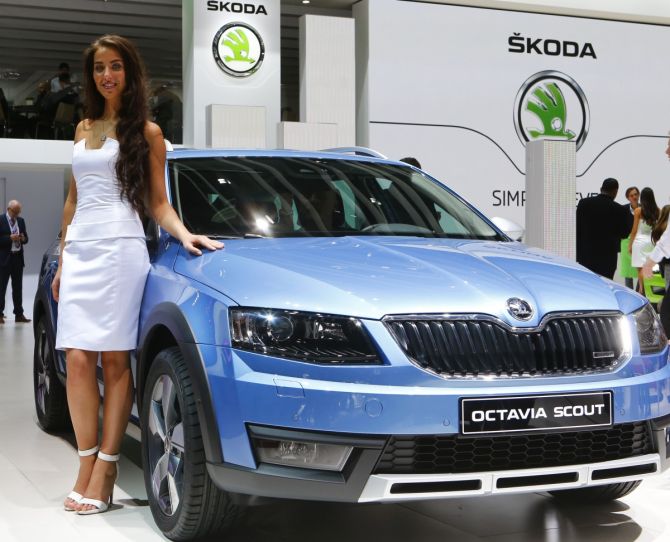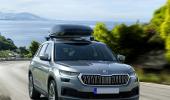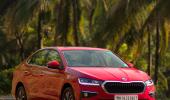'Now that all the early adopters have the electric car, governments are backing down in some countries because they do not have the money to subsidise so much.'

Skoda Auto India recently announced it will have a compact SUV by next year and is working on its electric vehicle (EV) strategy for the country.
In a roundtable with the media, Martin Jahn, a member of board of management for sales & marketing Skoda Auto a.s, said national policies for electric mobility are changing “very quickly” across the globe.
Skoda aims to bring a volume EV in India and rules out a plug-in hybrid car in the meantime, he said.
What is your plan for participating in the EV market in India?
The exciting announcement at this moment is for the compact SUV, which is a very important milestone for us to grow in the Indian market.
As for the electrification future in India, I am not at liberty to give you any details on this because no decision has been made. We are exploring all options.
We want to bring a volume electric car to India but how, when and in what form we are going to do it is not decided.
We are looking at options that would be the best for India -- whether doing it alone or going with any partner etc.
We, of course, want to participate in the growth of the electric car market in India.
What is Skoda's global strategy for electrification of its portfolio?
The world has committed itself to clean mobility, and the predominant way for that is electric and not hydrogen as much.
There are different approaches of European countries, Chinese, American, Indian governments to electric (vehicles).
Some markets dream to go 100 per cent electric but that is not realistic. One can go up to 30-50 percent electric (penetration).
We are very well established in the internal combustion engine (ICE) segment globally, and we want to grow that as long as it will be possible.
We have proven technology in the electric segment -- Enyaq was our first car and we have been extremely successful. We will also bring it to India.
We will bring some of the six other models (electric), which we have already announced in Europe and in some other countries, for India.
We know we have to bring a volume model for India and we are exploring the options.
We have to be flexible and agile to act according to customer wishes and government regulations.
There is big volatility with steel, raw materials for production of batteries, supply routes around the world.
At the moment we are extremely busy as the board of management (has) to decide which products and which form to bring to which countries. That's the big picture.
In Europe, around 10 per cent of our portfolio is now electric.
It should increase to 50-70 per cent by 2030, given the presumption that Europe goes full electric in 2035.
For countries like India, where electrification has just started, we have to see how it goes.
In some countries like Turkey or the Middle East, where we are strong, there are big reservations about electric mobility. So, it will probably go slower.

What kind of clarity do you seek from governments for deciding on which technologies to focus on for the future?
I have observed this globally, that these policies are changing very quickly.
The governments are changing them for many reasons.
We want to have as much clarity as possible from every government. But we have to be realistic, as we know that these policies will be developing.
The approach of the Indian government is very wise.
I understand that India, for political and economic reasons, wants to go electric.
We will see how that is possible by giving the power network ability to grow charging stations and the willingness of Indian consumers to buy an EV.
As a car manufacturer, is there any other cleaner technology apart from electric that you want to focus on?
Frankly, at the moment, there is no other technology for passenger cars but electric. Hydrogen did not prove to be viable.
Electric is the way that 99 per cent of car companies want on a larger scale.
The start was good as there are always early adopters who want to try something new.
Now that all the early adopters have the electric car, governments are backing down in some countries because they do not have the money to subsidise so much.
So, the strong growth in electric vehicles has slowed down a bit.
As car manufacturers we have to bear the burden of double investments in both technologies for some time and see how the world will develop.
That's the biggest challenge we have in the automotive industry – how to allocate investments.
That is why we are also very cautious and taking some time to decide how to bring the volume electric car to the Indian market.
Do you think it makes sense to bring a plug-in hybrid to India?
Some of our ICE technology has the same efficiency as hybrids or mild hybrids.
Plug-in hybrids are a relatively expensive technology that has been successful with government support and tax advantages. But the government will have to decide what the best way to electrify is.
If one uses both an electric and an ICE engine, then it is an expensive technology because you have two engines in the car.
Some countries choose it for the transition period because transition to full electric is difficult for the typical product customer.
So, there is no right or wrong. Normally, we will be in sync with the electric strategy and not get hybrids to India.
At the moment for us the plug-in hybrid would not be economic, or we could not sell it even with a minimum profit. At the moment it makes no sense for us.
Feature Presentation: Rajesh Alva/Rediff.com












 © 2025
© 2025